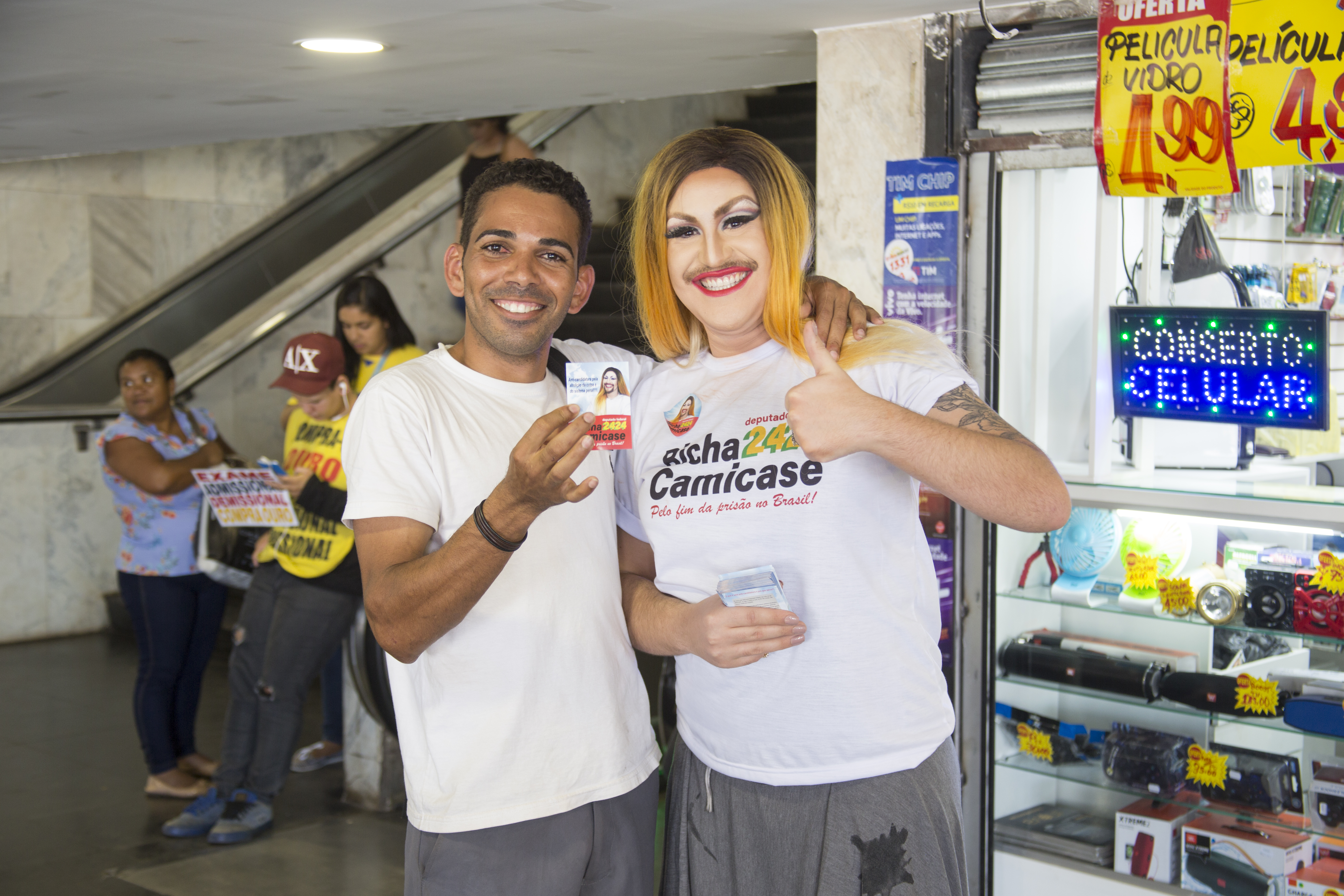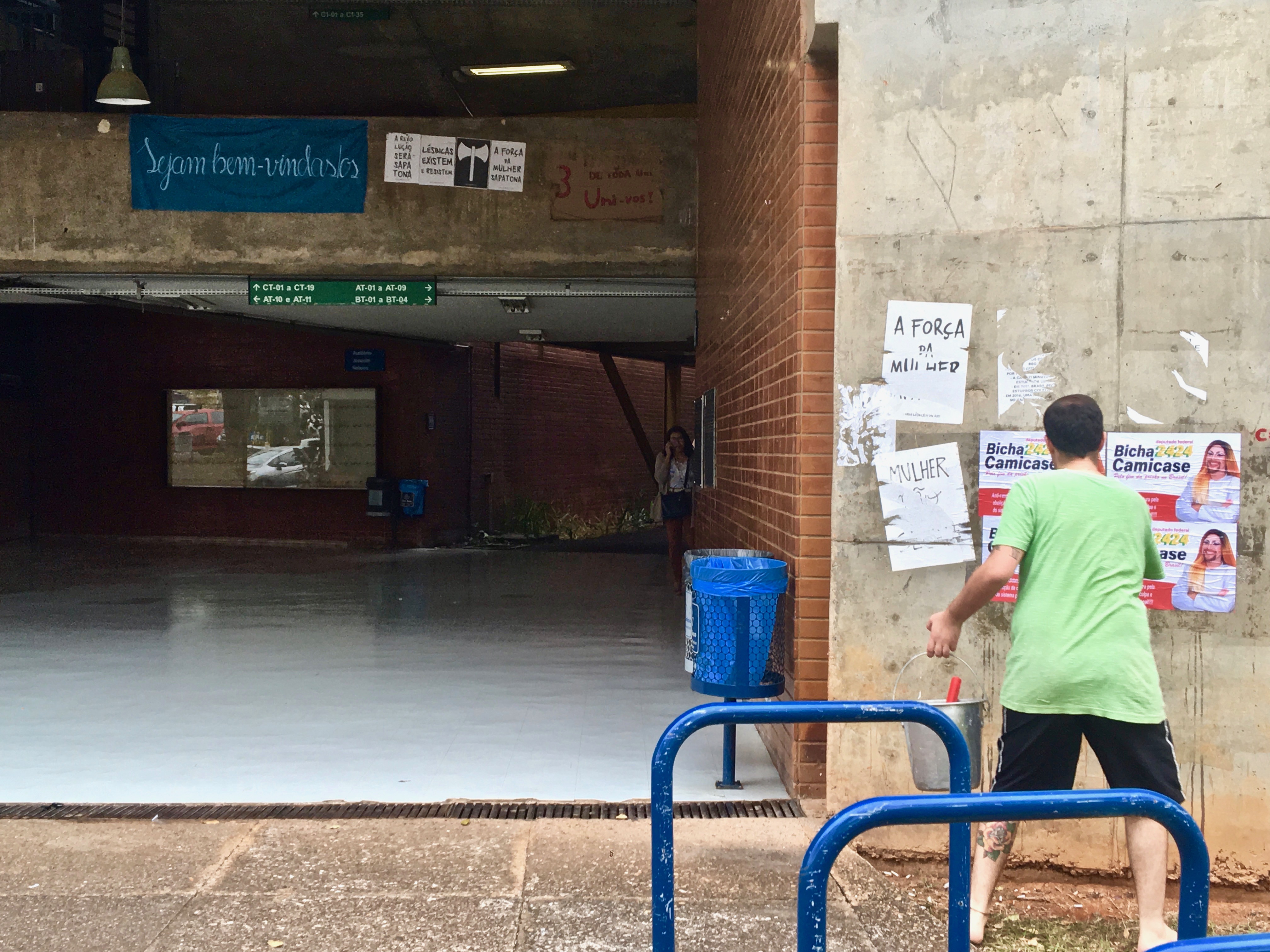Ação Bixa Kamikaze #5
ANTI-CANDIDATURA BICHA CAMICASE PARA DEPUTADO FEDERAL! VOTE 2424 PELO FIM DA PRISÃO NO BRASIL!
Bixa Kamikaze Action #5
BIXA KAMIKAZE FOR FEDERAL REPRESENTATIVE! VOTE 2424 TO ABOLISH PRISON IN BRAZIL!
2018
Performance
ANTI-CANDIDATURA BICHA CAMICASE PARA DEPUTADO FEDERAL! VOTE 2424 PELO FIM DA PRISÃO NO BRASIL!
Bixa Kamikaze Action #5
BIXA KAMIKAZE FOR FEDERAL REPRESENTATIVE! VOTE 2424 TO ABOLISH PRISON IN BRAZIL!
2018
Performance
PLATAFORMA-MANIFESTO ANARCOPENAL
(a) A pena criminal é ilegítima porque não realiza suas funções preventivas declaradas e, ao contrário, atua de maneira estigmatizante e seletiva - matando e prendendo, principalmente, pessoas negras e pobres.
(b) As bases da imposição de pena são, supostamente, o livre-arbítrio, a censura da vontade e a imposição de culpa - herança da tradição judaico-cristã.
(b.1) Se o Estado é laico, então pode o Direito Penal ser Direito Canônico?!
(b.2) É possível viver numa sociedade livre de culpa?
(c) Fora a liberdade de ir e vir, nenhum outro direito pode ser lesionado com a pena privativa de liberdade. A imposição da culpa penal não viola o status de ser humano.
(c.ÚNICO) O mecanismo discursivo da culpa é perverso, porque (entre outros) mascara o genocídio.
(d) A democracia representativa (com todas as forças econômico-políticas que a sustentam) é capaz de uma mudança que atenda aos interesses da clientela carcerária?
ANARCHO-CRIMINAL MANIFEST
(a) The criminal punishment is illegitimate because it does not accomplish its manifest preventive functions and stigmatizes and kills mainly black and poor people in Brazil.
(b) The prerequisits for punishment's imposition are, supposedly, the free will, its censorship and the imposition of guilt. Guilt is a christian-colonial tradition.
(b.1) If the State is secular, then can the Criminal Law be a Canon Law?!
(b.2) Is it possible to live in a guilt free society?
(c) Apart from the freedom to move around, no other rights may be infringed by the deprivation of liberty. The criminal guilt's imposition must not violate the human being status.
(SINGLE c.) The discursive mechanism of guilt is perverse, because (among others) it masks genocide.
(d) Is the representative democracy capable of a reform that meets the imprisoned clientele's interests?
(a) A pena criminal é ilegítima porque não realiza suas funções preventivas declaradas e, ao contrário, atua de maneira estigmatizante e seletiva - matando e prendendo, principalmente, pessoas negras e pobres.
(b) As bases da imposição de pena são, supostamente, o livre-arbítrio, a censura da vontade e a imposição de culpa - herança da tradição judaico-cristã.
(b.1) Se o Estado é laico, então pode o Direito Penal ser Direito Canônico?!
(b.2) É possível viver numa sociedade livre de culpa?
(c) Fora a liberdade de ir e vir, nenhum outro direito pode ser lesionado com a pena privativa de liberdade. A imposição da culpa penal não viola o status de ser humano.
(c.ÚNICO) O mecanismo discursivo da culpa é perverso, porque (entre outros) mascara o genocídio.
(d) A democracia representativa (com todas as forças econômico-políticas que a sustentam) é capaz de uma mudança que atenda aos interesses da clientela carcerária?
ANARCHO-CRIMINAL MANIFEST
(a) The criminal punishment is illegitimate because it does not accomplish its manifest preventive functions and stigmatizes and kills mainly black and poor people in Brazil.
(b) The prerequisits for punishment's imposition are, supposedly, the free will, its censorship and the imposition of guilt. Guilt is a christian-colonial tradition.
(b.1) If the State is secular, then can the Criminal Law be a Canon Law?!
(b.2) Is it possible to live in a guilt free society?
(c) Apart from the freedom to move around, no other rights may be infringed by the deprivation of liberty. The criminal guilt's imposition must not violate the human being status.
(SINGLE c.) The discursive mechanism of guilt is perverse, because (among others) it masks genocide.
(d) Is the representative democracy capable of a reform that meets the imprisoned clientele's interests?









︎ Lucena, Pedro Lacerda
Agradecimentos / Acknowledgements Diogo Araujo, Luisa Günther, Marina Araujo, Hayana de Sá, Matuza Dias, João Pedro Ricken, Hilan Bensusan, Suyan de Mattos, Fernanda Azou, Carlos Reis, Lucena, Pedro Lacerda.